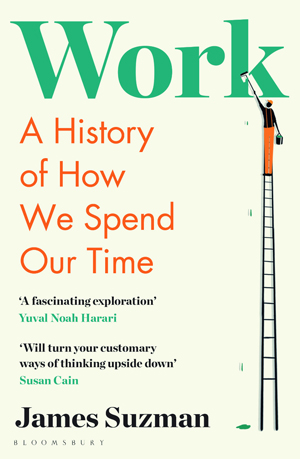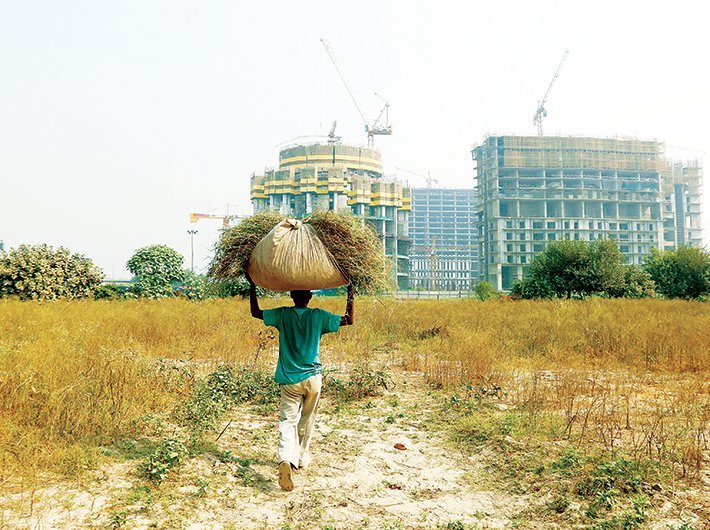Book Excerpt: Meaning of life for some, empowerment for others and drudgery for many more – work means different things to different people. Few, however, have any idea of its long history, which James Suzman brings alive
Work: A History of How We Spend Our Time
By James Suzman
Bloomsbury, 464 pages
 Among the many assumptions the pandemic has forced us to reconsider, those about work are already changing. The work-from-home trend is redefining what it means to be employed. Massive retrenchments last year affected more lives than Covid-19 itself. Governments prefer to dodge the imperative of lockdowns so that work continues.
Among the many assumptions the pandemic has forced us to reconsider, those about work are already changing. The work-from-home trend is redefining what it means to be employed. Massive retrenchments last year affected more lives than Covid-19 itself. Governments prefer to dodge the imperative of lockdowns so that work continues.
This work, the matter of holding a job or doing a business, has been the area on which most of us end up spending most of our waking hours. But it was not always so. James Suzman brings an anthropologist’s eye to narrate the long history of work. It makes for a fascinating reading, with its anecdotes and details as well as the grand overview. It’s a must-read to understand what is nearly the most important part of our lives. Here is an excerpt:
The Bright Lights
In August 2007, Thadeus Gurirab packed his clothes and a laminated copy of his school-leaving certificate into a flimsy carry-all, and made his way from the small family farm in eastern Namibia to the capital city, Windhoek. Thadeus’s parents always knew that their small farm could never support more than one family. They insisted that he, the second of four siblings, attend school so he might eventually get a ‘city job’.
On arrival, Thadeus moved in with his paternal uncle, his aunt, her mother and their three children. They lived in a corrugated-iron shack on a rocky ‘plot’ in Havana, a sprawling informal settlement on the hilly outskirts of the city.
Over a decade later, Thadeus still lives on the same plot in Havana. His uncle and aunt moved away in 2012, leaving the plot to him. He now has a ‘double-job’ as a security guard and janitor at one of the many evangelical churches where urban migrants congregate every Sunday to pray for good fortune. And he generates a little extra cash by renting out an additional corrugated-iron shack he built on the plot, which has enough space for a single mattress. It is home to two young men, both recent arrivals from the east, who also work as security guards. One sleeps in the shack during the day and works night shifts, while the other works day shifts and sleeps there at night. Thadeus is pleased with this arrangement. It means that someone is always on the plot to keep an eye on things.
Since 2012 Havana has nearly doubled in size and is not as safe as it used to be. He points out that the hills his shack overlooks, which were deserted when he arrived, are now just as crowded with structures as the side of the valley he lives on. And because hardly any of the new arrivals can find jobs, they have no choice but to beg or steal.
With a population of just half a million people, greater Windhoek is a fraction of the size of many of the world’s larger cities. Yet what has happened there is much the same as what has happened in many other parts of the developing world, albeit on a smaller scale.
Back in 1991, close to three-quarters of all Namibians still lived in the countryside. In the little over a quarter of a century since, Namibia’s total population has almost doubled. But while the rural population has increased by only one-fifth, Namibia’s urban population has quadrupled in size, mainly because of people like Thadeus making their way to the cities because the countryside was full. As a result, there are now nearly as many Namibians living in cities as there were people in the whole country in 1991. And with a government insufficiently solvent to take on a mass housing programme and unemployment rates hovering around 46 per cent among young adults, most of these new arrivals have to make do in informal settlements like Havana.
In 2007, Thadeus was one of an estimated 75 million new urban dwellers across the globe, many of whom, like him, left their countryside homes to make their fortunes in cities and towns. Each of them played a small role in pushing our species across an important historical threshold. By the beginning of 2008, more people lived in cities than in the countryside for the first time in our species’ history.
The speed of our transition from a species who didn’t much care to modify their environments to one that dwells in vast, complex, manufactured colonies is unique in evolutionary history. Where the urbanisation of termites, ants and bees occurred over millions of years, among humans it occurred in the blink of an evolutionary eye.
Humans may have only recently become what the Ju/’hoansi used to describe as ‘creatures of the city’. Even so, ever since the first small ancient cities started to coalesce in the Middle East, China, India, Mesoamerica and South America, they have been crucibles of creativity, innovation, power and diversity. They have also exercised an outsized influence over human affairs relative to their populations. It was not until the Industrial Revolution that cities anywhere routinely accounted for more than a fifth of the total population of any region, yet by then what happened in cities had already been dictating the trajectory of human history for upwards of 5,000 years.
Many of the most recent chapters in the story of Homo sapiens’ transformation into an urban species are written in the improvised, often chaotic freehand of crowded shanty towns which, like Havana, bloom on the fringes of the developing world’s cities and towns. Up to 1.6 billion
people now live in slums and shanty towns. The largest – like Kibera in Kenya, Ciudad Neza outside Mexico City, Orangi Town in Pakistan and Mumbai’s Dharavi – have populations counted in millions and are in some ways cities-within-cities. Their spidery thoroughfares stretch for mile after unplanned mile and have grown so fast that the best local municipal authorities have been able to do is scurry frantically behind them, clipboards in hand, trying to calculate how much it would cost and whether it is possible to retrofit basic services like water, sewerage and electricity.
Other recent chapters in the story of our drift into cities are written in altogether more orderly scripts. Most impressive is the oversized calligraphy of modern China’s urban planners and architects. Forty years ago, four in five Chinese lived in the countryside; now three in five live in homes and workplaces made of glass, cement and steel. […]
Excerpt reproduced with the permission of the publishers.
